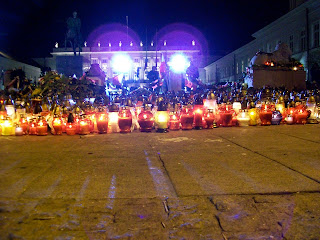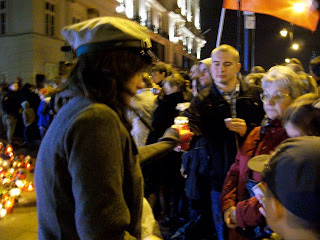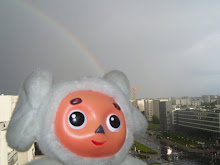It's no secret that not a lot of people like the Russians. The Poles despise them, the rest of Europe doesn't trust them, and the North Americans view them with a mixture of distrust and misunderstanding. Places like India and Armenia have warm relations with Russia (party because Armenia is surrounded by enemies and India needs an arms supplier that is not an ally of either Pakistan or China.) The Serbs adore Russia and Ukraine is split: part of Ukraine wants warmer relations with Russia and the other parts loathes it. I can also bring in the opinions of the Abkhaz, the Ossetians, the Georgians, the Chechens, the Ingush, and Kyrygz and the rest from Central Asia.
But let's move beyond lists of Russian-Foreign relationships. Russia remains a center of concern for much of the West. The 2008 war with Georgia drew widespread alarm (from the Baltic States, Poland, and Ukraine) and condemnation. Don't be fooled, Russia is modernizing its military (the recently flight for the Sukhoi PAK FA T-50, the development of the S-500 missile system, the introduction of the T-90 tank, etc), and it aims to not be the embarrassing mess of the 1990s. Beyond the military, Russia is trying to regain its sphere of influence (by using grants and loans) and push against US and EU intervention in the near abroad. But, the biggest thing about Russia; what just gets those in the EU the most, is that it is an energy superpower with a heavy hand.
What is surprising is that Angela Merkel, the Chancellor of Germany, has had her nose hilt-deep in Putin's ass. Or maybe it's not very surprising at all. Germany, like most of Europe, needs Russia's oil and gas, and Russia is happy to oblige. It's not that Germany admires Russia, or holds it in any esteem, it just wants easy access to reliable hydrocarbons. Russia, however, is anything but reliable. It seems like every winter they get into a tussle with Ukraine over unpaid bills, prices, and accusations of syphoning, and they threaten to turn off the taps, which they have done. This actually does little to affect most of western Europe, since that gas goes through Belarus and Poland. It will affect them even less when the Nord Stream pipeline is completed. There are moves, such as the Azerbaijan-Georgia-Turkey pipeline to curb reliance on Russia, but it's not seen as much.
Beyond the common spats with Ukraine that disrupt supplies, Europe (consequentially NATO and its allies) has a bigger problems. They can't really criticize or confront Russia very much, for fear that Russia might use energy as a weapon. Thus, both the EU and NATO are usually bound with one hand behind their backs when dealing with Russia. Russia throws a tantrum over something, and the rest of Europe is scrambling to think of how to calm it down without angering it too much. If there was a serious mixup with Russia (politically or militarily), Europe would face a catastrophic shortage of natural gas, and Russia knows it.
Enter Poland and shale gas. Optimistic forecasts of Poland's new shale gas wealth are extremely high. Some are even calling Poland the next Qatar (don't pull your pricks out of your pants just yet, lads. Let's see how much gas there really is in that rock before your start rolling on your rubbers to party.) Interest in Poland's potential gas wealth has exploded, with big-time US energy companies signing on. Many an economist and energy trader suffered whiplash from the speed at which they turned their heads to Poland.
Shale gas is becoming quite lucrative in the US, with many companies 'perfecting' its mining. New wells are being drilled constantly, often without thought of environmental impact. It's been said that many families in rural Pennsylvania (a top shale gas-producing state) can light their tap water on fire. It's likely that there will be greater restrictions and discretion in the permit process than currently in the States, which might slow development down a bit, but also might protect the inhabitants and environment a bit more.
But what does massive gas deposits mean for Poland? Will Poland turn into one of those hydrocarbon-reliant wonderlands where no one pays taxes, the government builds massive phallic buildings, and everyone is rolling around in obscene amounts of petrodollars while getting laid? Who knows (don't try to predict what will happen; you won't be right.) The point is, is that Poland stands a lot to gain both economically and geopolitically. Poland now gets about 70% of its gas from Russia and if Poland could produce enough gas to meet domestic demand (which would inevitably rise), it would be a amazing. If Poland could export gas to the conveniently-close-and-in-the-European-Union Germany, Czech Republic, Slovakia, Lithuania, and Austria, it would a miracle. Many of these countries are overwhelmingly reliant on Russian gas, and most of them think of Russia as kind of a dick.
The role of Poland in European politics would be immensely bolstered. Poland would be seen as a stable, reasonable ally that was worth protecting. Its strategic importance to the EU (and NATO) would expand greatly. Not only would it be a frontier state, it would be an important source of energy for its allies (this translates into: Europe and NATO would do a shitload to protect Poland from any sort of aggression (just like the US did with Kuwait) because it would be in their (Europe's and NATO's) strategic and economic interest.) Some might say that Russia would also sight its sights more keenly on Poland, since Poland would be seen as a key state to Europe's security (from an energy standpoint.) A worry and criticism from Poland, is that the US did not do enough to shield Georgia from Russia; they worried that the US would do the same to them (this is one of the reasons spurring Poland to accept the missile silos, which were downgraded to patriot missiles. They felt that if Russia was to invade (and the Poles don't put it past the Russians) that the US would only come to their aid because American troops and interests would be directly threatened.)
Poland, meanwhile, is hedging its bets and is in the process of signing a deal with Russia that will last until 2045. Until the real results can start flowing from Poland's gas fields, Poland and the EU will still be suckling on the metaphoric gas-nipple of Mother Russia.
Currently Poland's top gas producer.
Angela Merkel. Her boner will be second only to Tusk's in the event that Poland exports gas.





















_(cropped).jpg)
























































